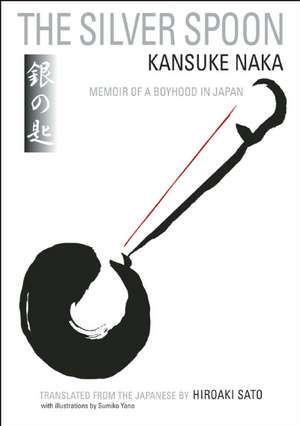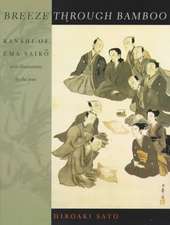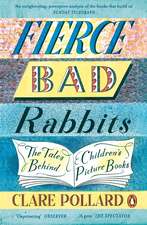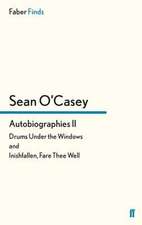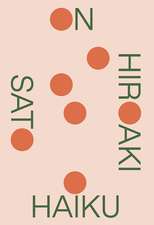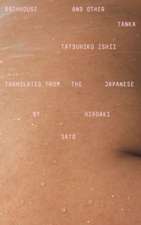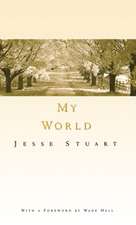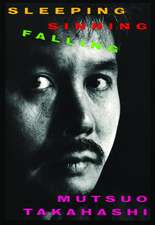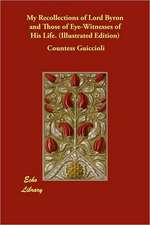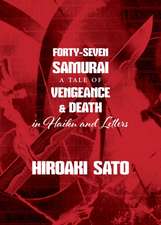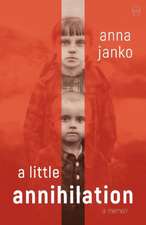The Silver Spoon: Memoir of a Boyhood in Japan
Autor Kansuke Naka Traducere de Hiroaki Satoen Limba Engleză Paperback – 26 oct 2015
Perhaps the most admired childhood memoir ever written in Japan, The Silver Spoon is a sharp detailing of life at the end of the Meiji period (1912) through the eyes of a boy as he grows into adolescence. Innocence fades as he slowly becomes aware of himself and others, while scene after scene richly evokes the tastes, lifestyles, landscapes, objects, and manners of a lost Japan.
Kansuke Naka (1885–1965) was a Japanese poet, essayist, and novelist. He was a student of the great novelist Soseki Natsume, who lavishly praised the “freshness and dignity” of Naka’s prose and encouraged the first publication of The Silver Spoon.
Hiroaki Sato is a writer, reviewer, and translator with over forty works of classical and modern Japanese poetry, prose, and fiction published in English. He has received the PEN American Center Translation Prize and the Japan-U.S. Friendship Commission Prize for the Translation of Japanese Literature. He lives in New York City and writes a monthly column on politics and society for the Japan Times.
Kansuke Naka (1885–1965) was a Japanese poet, essayist, and novelist. He was a student of the great novelist Soseki Natsume, who lavishly praised the “freshness and dignity” of Naka’s prose and encouraged the first publication of The Silver Spoon.
Hiroaki Sato is a writer, reviewer, and translator with over forty works of classical and modern Japanese poetry, prose, and fiction published in English. He has received the PEN American Center Translation Prize and the Japan-U.S. Friendship Commission Prize for the Translation of Japanese Literature. He lives in New York City and writes a monthly column on politics and society for the Japan Times.
Preț: 130.71 lei
Nou
Puncte Express: 196
Preț estimativ în valută:
25.01€ • 26.18$ • 20.82£
25.01€ • 26.18$ • 20.82£
Carte disponibilă
Livrare economică 10-24 martie
Preluare comenzi: 021 569.72.76
Specificații
ISBN-13: 9781611720198
ISBN-10: 1611720192
Pagini: 208
Ilustrații: B&W illustrations
Dimensiuni: 147 x 206 x 15 mm
Greutate: 0.27 kg
Editura: Stone Bridge Press
ISBN-10: 1611720192
Pagini: 208
Ilustrații: B&W illustrations
Dimensiuni: 147 x 206 x 15 mm
Greutate: 0.27 kg
Editura: Stone Bridge Press
Recenzii
Its enduring status as one of Japan’s most-loved accounts of life in Tokyo at the beginning of the 20th century is due not only to Naka’s historical details, but also because it is a parable for our contemporary sense of isolation. —The Japan Times
5/5 Stars "Wonderful, easy to read and filled with fascinating information on Japanese life and culture."—San Francisco Book Review
“An inherently fascinating and thoroughly absorbing read from beginning to end. Of immense interest for academia and the non-specialist general reader with an interest in Japanese history and culture.” —Midwest Book Review(January 2016 Reviewer’s Bookwatch)
Hiroaki Sato has done his readers a great service though his elegant translation of one of the great classics of modern Japanese literature, THE SILVER SPOON of Naka Kansuke. This “memoir of a boyhood in Japan” has been a much-loved text for Japanese readers since its publication in 1913. For readers who approach the text in English today, the book can be understood from a number of perspectives: as an intimate account of how a youngster grew from childhood into self-awareness, as a chronicle of the rapid changes coming to Japanese society opening up to the larger world during the Meiji period after 1868, and, finally, as a repository of the ways in which traditional Japanese culture shaped and colored the lives of ordinary Japanese citizens at the time. Complete with copious and useful notes on Naka’s contemporary culture, and with skillful illustrations by Yano Sumiko, the book is an absorbing glimpse into a now-vanished world and how it shaped the life of an individual writer of enormous talent.—J. Thomas Rimer, Professor Emeritus of Japanese Literature, Theatre, and Art at the University of Pittsburgh
The most recent offering by Mr. Sato is a marvelous new translation of the early twentieth century writer Kansuke Naka's iridescently poignant evocation of recollected childhood, The Silver Spoon (Gin no Saji). Naka's narrative hovers between and among many genres: autobiography, fairy tale, reminiscence, Bildungsroman and lyrical reverie, possessing a delicacy and vulnerability that enrapture and devastate the reader in turn. In Sato's nuanced and subtle rendering, we, as readers, re-experience the strange fluidity of a child's tentative apprehension of the looming world around, that wondrous and unsettling sense of discovery amid the flux." —Meera Sushila Viswanathan, Associate Professor of Comparative Literature, Brown University
5/5 Stars "Wonderful, easy to read and filled with fascinating information on Japanese life and culture."—San Francisco Book Review
“An inherently fascinating and thoroughly absorbing read from beginning to end. Of immense interest for academia and the non-specialist general reader with an interest in Japanese history and culture.” —Midwest Book Review(January 2016 Reviewer’s Bookwatch)
Hiroaki Sato has done his readers a great service though his elegant translation of one of the great classics of modern Japanese literature, THE SILVER SPOON of Naka Kansuke. This “memoir of a boyhood in Japan” has been a much-loved text for Japanese readers since its publication in 1913. For readers who approach the text in English today, the book can be understood from a number of perspectives: as an intimate account of how a youngster grew from childhood into self-awareness, as a chronicle of the rapid changes coming to Japanese society opening up to the larger world during the Meiji period after 1868, and, finally, as a repository of the ways in which traditional Japanese culture shaped and colored the lives of ordinary Japanese citizens at the time. Complete with copious and useful notes on Naka’s contemporary culture, and with skillful illustrations by Yano Sumiko, the book is an absorbing glimpse into a now-vanished world and how it shaped the life of an individual writer of enormous talent.—J. Thomas Rimer, Professor Emeritus of Japanese Literature, Theatre, and Art at the University of Pittsburgh
The most recent offering by Mr. Sato is a marvelous new translation of the early twentieth century writer Kansuke Naka's iridescently poignant evocation of recollected childhood, The Silver Spoon (Gin no Saji). Naka's narrative hovers between and among many genres: autobiography, fairy tale, reminiscence, Bildungsroman and lyrical reverie, possessing a delicacy and vulnerability that enrapture and devastate the reader in turn. In Sato's nuanced and subtle rendering, we, as readers, re-experience the strange fluidity of a child's tentative apprehension of the looming world around, that wondrous and unsettling sense of discovery amid the flux." —Meera Sushila Viswanathan, Associate Professor of Comparative Literature, Brown University
Notă biografică
Kansuke Naka (1885–1965) was a Japanese poet, essayist, and novelist. He was a student of the great novelist Soseki Natsume, who lavishly praised the “freshness and dignity” of Naka’s prose and encouraged the first publication of The Silver Spoon.
Hiroaki Sato is a writer, reviewer, and translator with over forty works of classical and modern Japanese poetry, prose, and fiction published in English. He has received the PEN American Center Translation Prize and the Japan-U.S. Friendship Commission Prize for the Translation of Japanese Literature. He lives in New York City and writes a monthly column on politics and society for the Japan Times.
Hiroaki Sato is a writer, reviewer, and translator with over forty works of classical and modern Japanese poetry, prose, and fiction published in English. He has received the PEN American Center Translation Prize and the Japan-U.S. Friendship Commission Prize for the Translation of Japanese Literature. He lives in New York City and writes a monthly column on politics and society for the Japan Times.
Cuprins
Acknowledgments
Introduction
Part 1
Part 2
Notes
Introduction
Part 1
Part 2
Notes
Descriere
Japan's most beloved memoir, from the early 20th century, "an extraordinarily beautiful evocation of the world of childhood" (Howard Hibbett).
